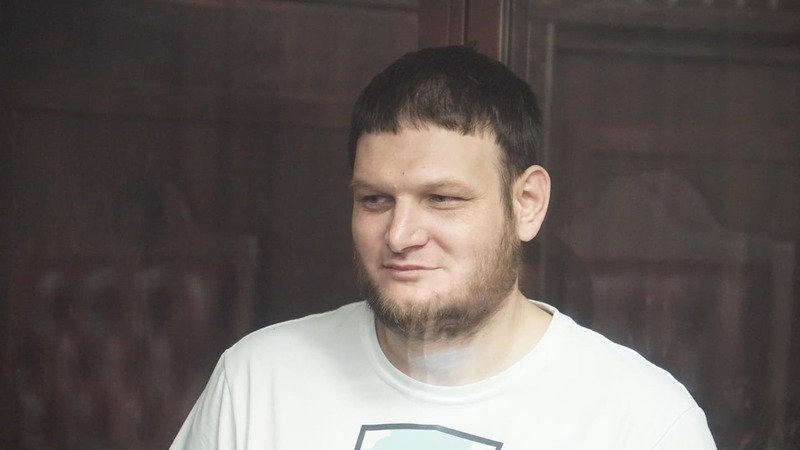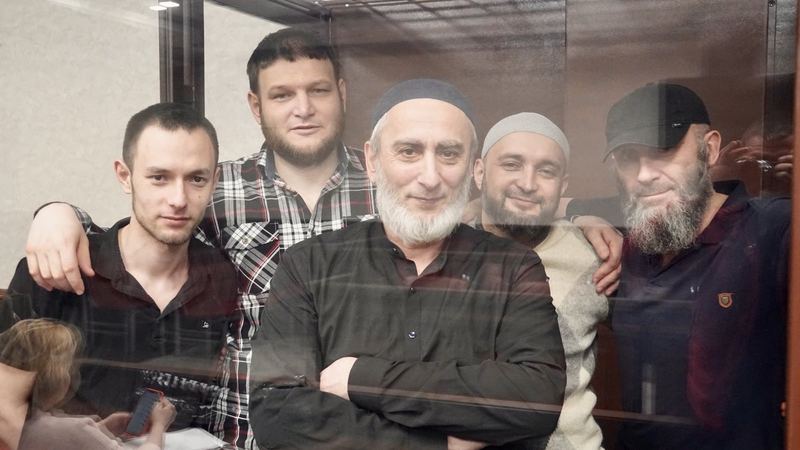• Topics / Freedom of conscience and religion
Crimean Tatar journalist sent to Siberia for 19 years for reporting on Russian repression in occupied Crimea

Unlike the Soviet Union under Stalin, modern Russia does not officially execute those the regime finds inconvenient. In occupied Crimea, those journalists and civic activists who expose Russian repression are most often labelled ‘terrorists’ and sentenced to horrifically long terms of imprisonment. This became evident fairly soon after Russia’s invasion and annexation, but it was in March 2019 that Russia dropped all pretence, arresting 25 Crimean Tatar civic journalists and activists, most of them from the important Crimean Solidarity human rights movement.
The arrests elicited international outrage and condemnation of Russia’s evident abuse of ‘terrorism’ charges to try to crush the Crimean Tatar human rights movement. The initial international attention was probably one of the reasons why the 25 men were not put on trial together, but in five separate cloned ‘trials’. Some of the sentences are still awaiting appeal, with one of the 25 men, 60-year-old Dzhemil Gafarov, having been effectively tortured to death. The first five men to be ‘tried’ received especially shocking sentences, with prominent human rights journalist Remzi Bekirov and human rights defender Riza Izetov both sentenced to 19 years’ harsh regime imprisonment, with the first five of these in a prison, the worst of all Russia’s penal institutions.
As well as the gravely flawed indictment, Russia is flagrantly violating international law which prohibits it from applying its legislation on illegally occupied Ukrainian territory. It is also flouting the European Court of Human Rights by sending Ukrainian citizens to prisons and prison colonies thousands of kilometres from their families and homes in Crimea. Many of these penal institutions are in places which became notorious in the twentieth century as the GULAG, the system of Soviet labour camps
Remzi Bekirov has just been sent to one of these prisons, in Yeniseysk (the Krasnoyarsk krai, Siberia) where, if Russia is not stopped, he will be held in intolerable cel conditions for most of the next five years. His lawyer, Edem Semedlyaev, reported on 6 July that Bekirov had now reached the prison and had been placed in a quarantine cell. Russia continues to use a gruelling system of transporting prisoners, with this a particularly dangerous time as lawyers have no access to the political prisoners and do not even know where they are.
Any political persecution is a crime, and Remzi Bekirov had played a major role in ensuring that the persecution of Crimean Tatars and other Ukrainians under Russian occupation did not go unnoticed. A historian and tour guide by profession, Remzi became one of the first Crimean Solidarity civic journalists, reporting on armed searches, arrests and politically motivated trials in occupied Crimea. It was he who streamed information about the detention in early March of Archbishop Klyment, the Head of the Orthodox Church of Ukraine in Crimea which Russia has systematically tried to destroy.
His activities were undoubtedly an irritation to Russia’s FSB. He constantly faced administrative prosecutions, including brief terms of imprisonment. When that didn’t silence him, the FSB came back again, arresting him on 27 March 2019, in the worst ‘operation’ to date against civic journalists and activists.
Bekirov himself called the measures against him a message to all Crimean Tatars "that they should be frightened, not come out, not be active". It was a message that he saw no option but to ignore.
Shortly before Russia’s full-scale invasion of Ukraine, former US Ambassador to Ukraine, William Taylor wrote to Bekirov in Russian imprisonment, expressing admiration for his work as a journalist in occupied Crimea and making it quite clear that he understood that Bekirov was incarcerated for his courage and commitment.
He thanked Bekirov for his and his family’s sacrifice, and called Remzi “an inspiration, not only to your fellow Ukrainians, but to freedom-loving people around the world. Europeans and Americans are appalled at your treatment and committed to your release.”

Remzi Bekirov was ‘tried’, together with Riza Izetov; and three Crimean Solidarity civic activists: Shaban Umerov; Raim Aivazov and Farkhod Bazarov.
The men were accused solely of ‘involvement’ in the peaceful transnational Muslim organization, Hizb ut-Tahrir. This is legal in Ukraine (and most other countries), but a suspiciously secretive. and probably politically motivated Supreme Court ruling from 2003 declared the organization ‘terrorist’, It provided no explanation for the ruling, although this was clearly required since Hizb ut-Tahrir is not known to have committed any acts of terror anywhere in the world. Bekirov and the other men named above were accused of the more serious charge of organizing a Hizb ut-Tahrir group’ under Article 205.5 § 1 of Russia’s criminal code, the others with involvement in such an alleged group (Article 205.5 § 2). In March 2020, all 25 men were also charged, under Article 278, with “planning a violent seizure of power and change in Russia’s constitutional order”. The decision as to whether a person is charged with ‘organization’ of, or only ‘involvement’ in, an unproven Hizb ut-Tahrir group is also fatally flawed. The charge against Raim Aivazov was changed in open reprisal after he refused to retract his testimony regarding the torture he had been subjected to during his arrest. Proof that the FSB had doctored ‘anonymous witness’ testimony to accommodate the change in charge against Aivazov was presented in court yet ignored.
In his 2021 report on occupied Crimea, the UN Secretary General condemned Russian convictions based almost exclusively on anonymous testimony and pointed to credible evidence that the judges effectively take the side of the prosecution. This was glaringly evident during this ‘trial’ and the sentences passed on 10 March 2022 by ‘judges’ Oleg Volkov (presiding); Vitaly Mamedov and Magomedbasir Shuyapov from the Southern District Military Court in Rostov (Russia).
Crimean Solidarity and Grani.ru journalist Remzi Bekirov (b. 1985); lawyer and human rights defender Riza Izetov (b. 1979) were sentenced to 19 years; Crimean Solidarity activists Shaban Umerov (b. 1969) to 18 years; ; Raim Aivazov (b. 1994) to 17 years; and Farkhod Bazarov (b. 1986) to 15 years. Those sentences were even slightly higher than those demanded by prosecutor Yevgeny Kolpikov.
These sentences were upheld on 28 March 2023 by presiding ‘judge’ Sergei Vinnyk and his colleagues from the Military Court of Appeal in Vlasikha (Moscow region).
All of the above individuals named, as well as the FSB ‘investigators’, fake ‘anonymous witnesses’, ‘experts’, etc. knowingly took part in sentencing men who had committed no crime to huge terms of imprisonment.
Please help to ensure that these prosecutions are known about and that the victims are not forgotten. Publicity is also needed to ensure that those who take part in such political persecution of Ukrainian citizens are held to answer, being, at very least, placed under international sanctions.
PLEASE WRITE to Remzi Bekirov and, if possible, the other men. The letters tell them and Moscow that they are not forgotten. Letters need to be in Russian, and on ‘safe’ subjects. If that is a problem, use the sample letter below (copying it by hand), perhaps adding a picture or photo. Do add a return address so that the men can answer.
The addresses below can be written in either Russian or in English transcription. The particular addressee’s name and year of birth need to be given.
Sample letter
Привет,
Желаю Вам здоровья, мужества и терпения, надеюсь на скорое освобождение. Простите, что мало пишу – мне трудно писать по-русски, но мы все о Вас помним.
[Hi. I wish you good health, courage and patience and hope that you will soon be released. I’m sorry that this letter is short – it’s hard for me to write in Russian., but you are not forgotten. ]
Remzi Bekirov
663180, Российская Федерация, Красноярский край, г. Енисейск, ул. Декабристов, 11, ФКУ Тюрьма-2
Бекирову, Ремзи Рустемовичу, г.р. 1985
[In English: 663180 Russian Federation, Krasnoyarsk Krai, Yeniseysk, 11 Dekabrist St, Prison No. 2
Bekirov, Remzi Rustemovych, b. 1985]
Riza Izetov
РФ, 600020, Владимир, ул. Большая Нижегородская, д. 67, Тюрьма № 2 “Владимирский централ"
Изетову, Ризе Мустафаевичу , г.р. 1979
[In English: Russia, 600020, Vladimir, Bolshaya Nizhegorodskaya St. 67, Prison No. 2
Izetov, Riza Mustafayevych, b. 1979 ]
Shaban Umerov
РФ, 457670 Челябинская обл., г. Верхнеуральск, ул. Северная 1, Тюрьма по Челябинской области
Умерову, Шабану Изетовичу, г.р. 1969
[In English: Russia, 457670 Chelyabinsk oblast, Verhneuralsk, ul. Severnaya 1, Chelyabinsk oblast Prison
Umerov, Shaban Izetovych, b. 1969 ]
Please check here later for the addresses of Rayim Aivazov and Farkhod Bazarov which will be added as soon as they are known.





